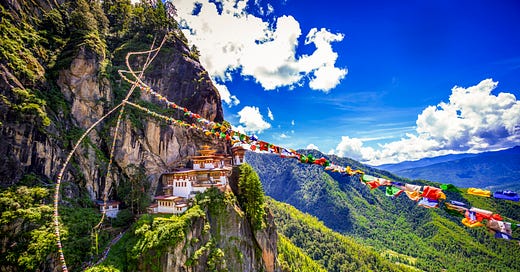With all of the developments over the last few years in regard to El Hodlador’s bitcoin treasury, Germany’s lack thereof, and the uncertainty around the future of American, Chinese and British bitcoin reserves, a plucky new player has entered the game: The Royal Kingdom of Bhutan. The traditional name for Bhutan, Druk Yul, means “Land of the Thunder Dragon”; but in lieu of hoarding gold in a cave, the native dragon population now prefers bitcoin, procured largely with hydroelectric power.
Bhutan is a small, Buddhist country in the Himalayas (population under 800,000), which became a monarchy in 1907, before transitioning to a constitutional monarchy in 2008 under the current Dragon King (Druk Gyalpo), Jigme Khesar Namgyel Wangchuck. This makes Bhutan quite a unique country, but it isn’t the only reason that it is special.
Gross National Happiness
One of the most intriguing parts of Bhutan’s governance has been to pursue a policy of Gross National Happiness (GNH) and to prioritise this above metrics like GDP. The development philosophy was introduced in the 1970s by the fourth Druk Gyalpo, Jigme Singye Wangchuck, under the belief that material development alone isn’t sufficient, and isn’t worth the compromises that it often entails. It is partly because of the nation’s strong Buddhist beliefs that such a direction was adopted.
As such, GNH is the government’s guiding policy, and places a core focus on the following:
Sustainable and equitable socioeconomic development
Competent and transparent governance
Preservation and promotion of culture
Environmental conservation
Although GDP is considered important, the government is only meant to enact policies if they are seen as beneficial through the lens of GNH.
How did they accumulate so much bitcoin?
Although a small country, Bhutan has abundant hydroelectric power, particularly during the wet seasons. Thanks to the geography of the country, the economy had hitherto been very specialised in agriculture and exporting their hydroelectric energy. After all, the mountains are home to numerous rivers, which are always full thanks to regular monsoons and run off from glaciers.
In terms of sustainable development, this has been wonderful for the country; 99% of Bhutan’s energy comes from hydropower — making it one of the only carbon negative countries in the world. The Bhutanese do not consume all of this energy, and so their main source of revenue is from exporting the surplus to neighbouring countries, particularly India which buys roughly 70% of it.
The government recognised that they can diversify their country’s economy by harnessing their hydroelectric surplus to mine bitcoin. Bhutan hasn’t actually bought any from the market at all; rather, using energy that they were producing anyway, they chose to mine it. There are several advantages to this over selling the surplus to India: receipt of fiat in international trade can be extremely risky, as countries like Russia are well aware, and there is huge value in owning and accumulating an apolitical asset. Circumventing counterparty risk for such a small nation is important, and cements Bhutan’s position as independent and sovereign (something their leadership understand well, given their Tibetan neighbours to the North).
How does Bhutan’s bitcoin stash rank?
There has been some speculation over the last few years that the Bhutanese government was mining bitcoin, but nobody knew how much. It wasn’t until Arkham Intelligence published Druk Holdings’ addresses (the investment arm of the government) that there was much clarity at all over how much they own.
According to Arkham, the country currently holds roughly ~13.2k bitcoin, which has been gradually accumulated since 2021.
This equates to more than twice as much as El Salvador holds, with their ~5.9k. But given that Bhutan has a significantly smaller population than El Salvador (800k versus 6.5m), and a lower GDP per capita ($3.7k versus $4.9k), Bhutan’s accumulation is all the more impressive, as they’ve accumulated far more in their national treasury per citizen than Bukele has managed to, whilst being an even poorer country. El Salvador has roughly ~0.0009 BTC/citizen, whilst Bhutan has ~0.016 (roughly 17x as much per citizen). If the UK wanted to buy as much bitcoin per capita as Bhutan, the government would need to accumulate roughly one million bitcoin — it’s probably already too late for this, but our Prime Minister does have a knack for fundraising.
In terms of government rankings, the first three states by bitcoin ownership (USA, China, UK) all accumulated their holdings through seizures. Bhutan is #1 when it comes to accumulating bitcoin through ingenuity and investment rather than using the state as a weapon against the citizenry. The most contentious example of such seizures is in the United States, where roughly ~90k of their ~200k BTC was seized from the hackers of Bitfinex, but rather than returning the stolen coins to their rightful owners, they are simply being held indefinitely by the state.
Bhutan is not slowing down, either. In a partnership with BitDeer Technologies, the country aims to increase its mining capacity from 100 MW to 600 MW by the middle of 2025.





